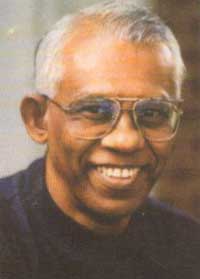by Tilak S. Fernando from Toronto
 On 8 September 2000 history was made in Canada, when the first Canadian Buddhist academic institution, Nalanda College of Buddhist Studies, in Toronto, opened its doors for 25 students of mixed gender from different ethno-cultural backgrounds.
On 8 September 2000 history was made in Canada, when the first Canadian Buddhist academic institution, Nalanda College of Buddhist Studies, in Toronto, opened its doors for 25 students of mixed gender from different ethno-cultural backgrounds.
Nalanda College became the first Canadian seat of learning approved by the Government of Ontario as a non profitable charitable organization to run post-secondary courses for 'the systematic study of Buddhism'
The objectives of Nalanda College are to provide an academic framework for the study of Buddhism; to facilitate personal spiritual growth; to assist students in the application of Buddhist principles in their everyday life and ultimately let such knowledge make an invaluable contribution towards the development of a harmonious multicultural society in Canada. Eve Wider has been the Founder's Vision to cultivate a Community of Better Human Beings.
Students at Nalanda College have access to the Tripitaka, the collection of Buddhist Teachings, said to be twelve times the size of the Bible, in its original form in Pali or Sanskrit; Chinese or Tibetan. With Vipassana, Zen and Tibetan meditation, as part of the core program, both in theory and practice, students are encouraged to transform themselves into calmer and happier human beings by the end of their study.
Nalanda College, located on the main campus of the University of Toronto, is increasingly becoming popular in Canada because of its 'non sectarian nature' and its focus on the basics of Buddhism, without layering of a specific tradition or lineage. Its aim is to offer the students an academic approach to Buddhism with a sincere spiritual commitment, which ultimately will help them understand the transient and the contingent nature of this world as well as the deep meaning of the word 'suffering' in a Buddhist context.
Nalanda is the brain child of Sri Lankan Canadian, Prof. Suwanda H. J. Sugunasiri who is currently on the Faculty of Trinity College, University of Toronto. Prof. Sugunasiri said he felt the need to provide an in-depth knowledge on Buddhism for the Canadian Buddhist community not because there weren't Buddhist teachers in over sixty centers in and around metropolis of Toronto, which well served their religious needs, but in his personal experience and assessment as President of the Buddhist Council of Canada, he felt there was still an unmet educational desire or a vacuum for the objective study of Buddhism free from cultural and/or sectarian bias despite having a plethora of books on the subject
Born in Sri Lanka, Prof. Sugunasiri left his mother country in 1964 to the US on a Fulbright Scholarship and completed a Master's Degree in Linguistics from the University of Pennsylvania. He arrived in Canada in 1967 and earned Master's degrees in Education and in Buddhism and the Scientific Study of Religion and a PhD, all at the University of Toronto. His doctoral thesis (1978) argued for a 'Humanistic Nationism', going beyond mere economic and political development, an idea which has caught on since.
Past Co-Vice Chair of the first Sinhalese temple in Toronto, the Toronto Mahavihara, his involvement with the wider Buddhist community in Toronto began in 1980 when he was the Founding Co-ordinator of the Buddhist Federation of Toronto. For over 20 years he has been a powerful voice on Buddhism in Canada and has delivered many lectures and discourses on Buddhism in Churches and Synagogues, and from various other platforms. In his column in the Toronto Star newspaper ( religious page ), he has sought to deal with everyday issues, such as abortion and bioethics, from a Buddhist perspective. Engaged in Buddhism-Christian Dialogue and initiating Buddhist-Jewish Dialogue, he was the Canadian delegate to the Asian Buddhist-Christian Dialogue held by the World Council of Churches in Korea in 1988. He is also the Founding Editor of Canadian Journal of Buddhist Studies, the very first Canadian academic journal on Buddhism. Currently, Prof. Sugunasiri is making plans to celebrate 100 years of Buddhism in Canada in 2005.
According to Prof. Sugunasiri, Nalanda College is unique because it seeks to combine theoretical knowledge with a personal experience in meditation, all based as emphasized by the Buddha, on sila ('morality'). With qualified Buddhist scholars with MA's and PhD's, and students having access to the vast library facilities of Toronto University, Nalanda has the same standards as at any Canadian or other University.
